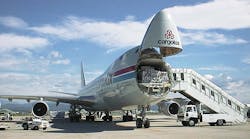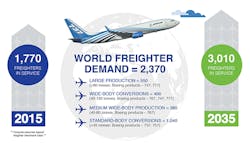Boeing Commercial Airplanes issued a 20-year outlook for global air-cargo traffic, calling for a consolidated annual growth rate of 4.2% in volume (evaluated in metric tonnage), and that this increase will result in significant demand for new and converted cargo jets needed to meet market demand by 2035. The data and projections are available in the jet-builder’s biennial World Air Cargo Forecast (2016-2017), released at an industry trade show in Paris.
The air-cargo market is important to Boeing, which has supplied over 90% of the world's dedicated air-cargo capacity, both express cargo or industrial goods. Its products include the 767-300, 777 and 747-8 freighter aircraft, and the 737BCF and 767-300BCF conversion freighters.
"The air cargo market has faced several years of below trend growth," stated Randy Tinseth, v.p. - Marketing. "As trade continues to recover, we're confident the air cargo market will see growth over the long-term."
Sustaining that growth will be two primary factors: the expansion of e-commerce, which Boeing projects will expand to a $3.6-trillion market by 2020; and the ongoing development of China’s express-delivery service sector, which is set to grow by 55% in volume and 39% in revenue by 2020.
In general, the OEM finds that market segments linked to the Asian regional economies will see faster average growth in air-cargo volumes than other regional markets. However, the express carriers still will trail dedicated freighters in cargo volumes: the latter will represent more than half of all air-cargo traffic over the 20-year period, and will continue to provide the majority of cargo capacity.
The global fleet comprising this market segment is seen expanding by 70% by 2035, with a total of 2,370 new freighter aircraft coming into service. Boeing sees demand for 550 new, large freighter jets and 380 new, medium wide-body freighters. Additionally, there will be demand for 400 wide-body jets converted to cargo aircraft, and 1,040 converted medium wide-body jets.







